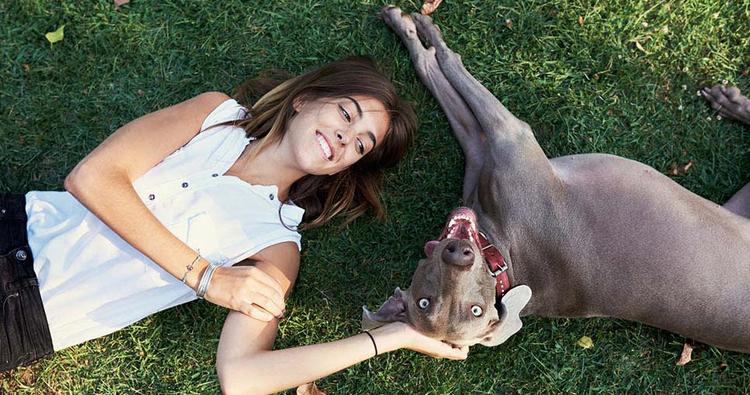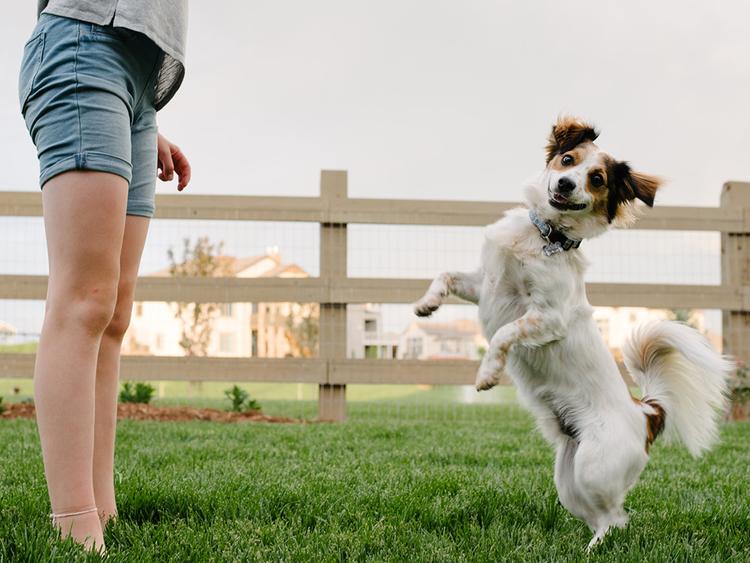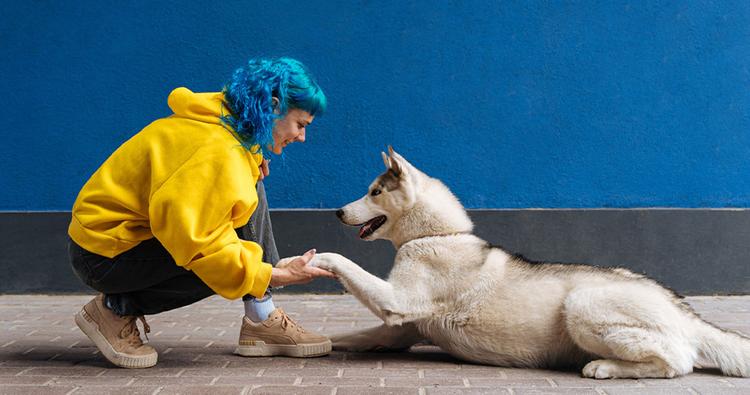Am I Ready For a Dog? 10 Signs You’re Ready
Getting a dog can be the best thing you ever do — if you’re prepared. Here’s a checklist any prospective pet parent should consider before adopting a new bestie.
Getting a dog can be the best thing you ever do — if you’re prepared. Here’s a checklist any prospective pet parent should consider before adopting a new bestie.
by Alicia Kort, | April 2, 2024

Sonja Rachbauer / iStock
Do you have canine fever? If you smile at every pup on the street, count down the days until you get to hang out with a friend’s dog, or spend a lot of time watching dog videos on TikTok — then you probably do. Perhaps you even know what kind of dog you would get, down to the breed (though we always recommend adopting from shelters), and have already begun perusing the best dog beds and leashes online.
If you’ve been dreaming about adding a pup to your family, you should make sure that you’re truly prepared on all fronts — your home, your schedule, your finances, and your mindset. Having a dog will change and disrupt your life in many ways (though most of them are positive). But you’re already doing your due diligence, because below we’ll go through all of the questions that you should ask before you head to the rescue to pick out your pup.
We’ve put together a checklist of sorts that’ll help you figure out if you’re ready to get a dog. You should be honest with yourself and set aside some time to really think about these questions, because having a dog is a life-long commitment.
As great as it is to daydream about having fun with your new pup, have you really dug into what kind of dog you want and are able to handle? For example, high-energy dogs require hours of exercise and playtime, otherwise they can become destructive. Dog breeds that are known to be anxious will need plenty of attention and benefit from a pet parent who is more of a homebody. Do you work from home, or will you need a dog walker to come multiple times a day? You should do some research on the type of dog you want. You’ll have to meet mixed breeds in-person at a shelter, and you should talk to the staff there about what kind of households they are best suited for.

Thinking of adopting a rescue dog? Learn more about the challenges of dog rescue and how you can help transition a new friend into your home.
Dogs, especially when they are adjusting to a new home, take up a lot of time in a day. They want their new pet parent to be around in this unfamiliar environment, otherwise they will be anxious and might become destructive. If you are constantly rushing to appointments, dinners, workout classes, and maybe spending an hour in your home in the mornings and an hour before you go to sleep, you may not be ready for the time commitment that a dog will require. Dogs don’t want to spend all day and night waiting for you to return home. They deserve long walks, plenty of playtime, and long stints of snuggles on the couch while you stream TV shows and movies.
If you’re adding another being into your home, you should have enough room for them — though that will also depend on what size dog you get. If you get a small, pint-size pooch you can slip into your purse, they’ll be happy with your studio apartment or one bedroom, as long as there’s a cozy corner to curl up into and a small radius for fetch and playtime. If you get a large dog, they will thrive in a duplex or a house, ideally with a yard of their own for running around. You can have a big dog in a two-bedroom apartment in a major city, but you’ll have to compensate with lots of long walks and dog-park excursions.
Getting a dog requires the approval of everyone in your household, especially if you have roommates. You might think that your new dog won’t affect anyone else, but they will. They might bug your roommate to play with them if they work from home, for example, or tear up a few pairs of shoes. It’s best to hold off on getting a dog until everyone is an enthusiastic “yes.” Otherwise, family or housemates might resent you and your dog, or create an untenable living situation.
Being a new pet parent is sort of like raising a toddler. Your pet is in a new environment — you’re going to have to expect some accidents in the house and not listening (or understanding) commands and expectations. There might be times at which you need to take a few deep breaths if a pair of your favorite shoes gets destroyed. It’s also not fair to you or your pup if you decide you don’t have enough energy to take them out every two hours, or you don’t have the mental stamina to teach your new pup “sit.” You need to make sure that you’re prepared for the unfun parts of pet parenting.
Bringing a new dog into your house is not cheap. There are a lot of upfront costs (vet bills, pet supplies, and adoption fees), as well as recurring costs, such as food and new toys. Let’s say you go out of town. You’ll have to pay for a dog sitter or a place to board your dog while you’re away. You should map out these costs in your monthly budget to make sure that having a dog is something that you can afford.
If you’ve answered “yes” to every question so far, take a look at your calendar. If you’ve got trips coming up in the next three to four months, you should wait to get a dog until you return. Your new pup will be so confused and anxious, and might even feel abandoned. You owe it to your pup to be consistently present after bringing them into their new home.
Getting a dog is a major life event, so it’s important not to add more stressful changes on top of that. If you’re moving, starting a new job, becoming a caregiver, becoming a parent, or getting married, we’d recommend holding off until you get through that major life event first. Your pup deserves your full attention during this transition, which is not only challenging for you but also for them.
Life happens. You may feel ready to dive headfirst into pet parenthood, but life often has other ideas. Let’s say you bring your new pup home and two weeks in, you lose your job. In that case, it’s important to have an emergency fund that will take care of both of you. Or for example, there’s an unexpected death in the family, and you have to fly across the country for a week. You need to have a back-up dog sitter (or ideally, more than one).
We mentioned earlier that having a dog is a lifetime commitment, and this is something worth repeating. The lifespan of a dog varies by breed and size, but your dog could live for up to 17 to 18 years. They’re counting on you to be their pet parent over that time. If you aren’t ready to commit that many years to raising your pup, you are better off fostering or volunteering for a rescue.
Puppies and dogs might be part of the same species, but when it comes to adopting them and bringing them into your home, they are different beasts entirely. Puppies require more patience, more time, more energy, and more money. They are much more of a commitment than an adult dog. For more details on many of the sacrifices it takes to raise a puppy, check out our guide.
Yes, you can get a dog if you work full-time, but you should try to come home for lunch or have a dog-walker if you don’t work from home or send your dog to doggie daycare a few days a week. This will ensure that they don’t get too lonely or anxious and are getting enough exercise.
If you answered “no” to any of the questions above, you aren’t ready to get a dog. You need to make sure that you have enough time, your life is stable, and that you can be prepared for emergencies if something happens. You should only get a dog if you can answer “yes” to all of the questions above.
You should consider adopting a dog rather than buying from a breeder, because there are so many amazing (and downright adorable) dogs languishing in shelters just waiting to find their home. If you adopt from a rescue, you will open up a spot in that rescue for another dog, thus saving lives. Plus, your new pal will be so grateful to find their new family. Use Adopt a Pet to find adoptable pups near you.
If you live in a location with extreme weather, it’s advisable to start your journey into pet parenthood during more temperate times, such as fall or the less aggressively rainy days of spring. Both you and your pooch will be grateful for this forethought.

Alicia Kort is a writer and editor living in Brooklyn. She’s currently the senior commerce editor at Apartment Therapy. She’s been published in StyleCaster, Electric Literature, Newsweek, Interview, Brooklyn magazine and more. In her free time, she runs, reads, and spends time with her dog-nieces, Maya and Lady, and her cat-niece, Pepper.

Adoption Advice

Adoption Advice

Adoption Advice

Adoption Advice
Did you just bring home an adorable puppy?

Breed Info
Are you thinking of adopting a dog that is easy to care for? Here is what it takes to keep them happy and healthy.

Adoption Advice
Find out how to set your adopted rescue dog up for success.

Adoption Advice
Your dog can adjust to a new name, and it’s easier than you might think.


Adoption Advice
Short answer: Absolutely. After a little preparation, you’ll find immense ease and satisfaction in opening your home to a sight-impaired pup.